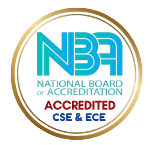Industry Institute Interaction Cell, (IIC)
Committee Coordinator: Dr.Nandeeswar S B, Department of ISE
Vision
To transform APS College of Engineering into a pivotal hub for bridging the gap between academia and industry, nurturing students with real-world skills, and fostering innovation.
Mission
- Facilitate impactful industry-academia collaborations to bridge the chasm between theoretical learning and practical applications, promoting holistic student development.
- Enable experiential learning through internships, workshops, and industrial visits, equipping students with industry-relevant knowledge and skills.
- Promote collaborative research and innovation by cultivating an environment conducive to interactions between industry and faculty, driving mutual growth and societal impact.
Goals
- Cultivate strong ties with the industry that align with students' ambitions, enabling them to adapt their knowledge to the industrial culture.
- Promote various industrial activities such as participation in regular seminars, guest lectures, and conferences related to the industry, involving faculty members and students.
- Forge closer links and promote research tailored to industry needs and consultancy.
- Provide continuing education to industry professionals, empowering them to upgrade their technical knowledge and obtain higher degrees.
- Offer career guidance by organizing talks by senior business executives, facilitating networking and teamwork through partnerships.
- Establish Memoranda of Understanding and Agreements with various industrial and research organizations.
Activities at Industry Institute Interaction Cell
- Memoranda of Understanding (MoU)
- Industrial training, webinars, and seminars for students and faculty
- Product development initiatives
- Internships and industry visits
- Industry consultancy projects
- Industry-sponsored research and development projects
- Utilization of industry resources (equipment, library, personnel, etc.)
Benefits from Industry Institute Interaction Cell (IIIC)
The Industry Institute Interaction Cell (IIIC) within an educational institution plays a pivotal role in bridging the divide between academia and industry, fostering a mutually beneficial relationship among all stakeholders. It serves as a platform for meaningful collaboration, enhancing the overall learning experience and preparing students to become industry-ready professionals.
Here are some of the benefits of establishing an IIIC at APS College of Engineering:
- Enhanced Employability: One of the primary benefits of an Industry Institute Interaction Cell is its contribution to enhancing students' employability. By promoting industry exposure, internships, and skill development programs, the IIIC equips students with practical knowledge, hands-on experience, and relevant skills demanded by employers, increasing their chances of securing better job opportunities upon graduation.
- Industry-Relevant Curriculum: The IIIC actively engages with industries to gather insights into their evolving needs and requirements. This information helps in updating the college's curriculum to make it more industry-relevant. By incorporating the latest advancements and practices, students are better prepared to meet the challenges of the real world.
- Practical Learning: The IIIC provides students with valuable opportunities for practical learning through industry-sponsored projects, workshops, and seminars. Such hands-on experiences enable students to apply theoretical knowledge in real-world scenarios, fostering a deeper understanding of concepts.
- Collaborative Research and Innovation: Industry-academia collaboration facilitated by the IIIC leads to collaborative research and innovation. Faculty and students can work together with industry experts on research projects, resulting in cutting-edge solutions and advancements that benefit both academia and industry.
- Entrepreneurial Ecosystem: The IIIC nurtures an entrepreneurial spirit among students by providing support, mentorship, and networking opportunities for aspiring entrepreneurs. This encourages students to explore innovative ideas and launch their own startups, contributing to economic growth and job creation.
- Industry Expertise: Regular guest lectures and interactions with industry professionals organized by the IIIC expose students to the latest industry trends, practices, and challenges.
- Industry Sponsorships and Funding: The IIIC can attract industry sponsorships and funding for various initiatives, research projects, and events. This additional financial support enhances the college's capabilities and resources, benefiting students and faculty alike.
- Global Exposure: The IIIC can facilitate international collaborations and exchange programs with industries and universities abroad. This exposure broadens students' horizons, enriches their cultural experiences, and fosters global perspectives.
- Networking Opportunities: The IIIC provides a platform for students to build strong industry networks. Through events, workshops, and seminars, students can interact with professionals and potential employers, paving the way for internships and job placements.
- Industry-Academia Branding: A robust Industry Institute Interaction Cell strengthens the college's reputation and brand by showcasing successful industry partnerships, impactful research outcomes, and the employability of its graduates. This attracts more industry collaborations, research grants, and talented students to the college.
In summary, the establishment of an Industry Institute Interaction Cell in APS College of Engineering provides numerous benefits that contribute to the holistic development of students, the growth of the college, and the progress of industries. By fostering strong industry-academia connections, the IIIC plays a crucial role in shaping the student community, making them a strong workforce for the future, and driving innovation in various sectors.




